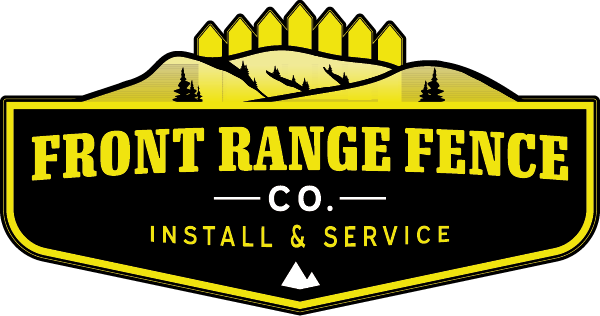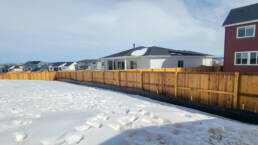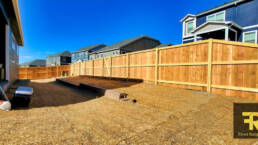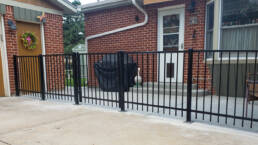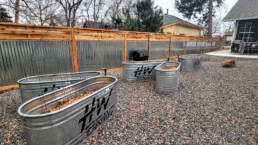When it comes to enhancing the privacy, security, and aesthetic appeal of your Denver home, installing a residential fence is a great choice. However, before you dive into this project, there are several key factors you should consider to ensure your new fence meets your needs and expectations. At Front Range Fence, your trusted fencing company in Denver, we understand the importance of making an informed decision. In this blog, we will discuss seven crucial factors to consider before installing a residential fence.
Purpose of the Fence
Defining the purpose of your residential fence is the foundation of a successful fencing project. By pinpointing your specific goals, you can make informed decisions about design, materials, and other crucial factors. Let’s delve deeper into some common purposes for installing a residential fence:
- Privacy: Many homeowners install fences primarily to enjoy increased privacy in their outdoor spaces. If privacy is your key objective, consider taller fence designs and materials that block the view from outside, such as solid wood panels or vinyl privacy fences.
- Security: Fencing can serve as an effective security barrier, deterring unwanted intruders and safeguarding your property. For security, choose sturdy materials like metal or aluminum, and consider adding features like locks, gates, and motion-activated lighting.
- Aesthetic Enhancement: Fences can enhance the overall look of your property, adding curb appeal and value. Decorative fences, ornamental wrought iron designs, or custom-crafted wood fences can create an attractive focal point for your home.
- Safety: For households with children or pets, safety is a primary concern. Fences can help keep kids and pets within the boundaries of your property, protecting them from potential hazards, such as busy streets.
- Property Division: In some cases, the primary purpose of a fence is to clearly mark property boundaries and prevent boundary disputes with neighbors. Clear and defined property lines can save you from legal issues and maintain peaceful neighborly relations.
Local Regulations and Permits
Understanding the local regulations and obtaining the necessary permits is a critical step in any residential fencing project, as these requirements can vary depending on your location. Here are some key points to consider regarding local regulations and permits:
- Height Restrictions: Many cities and counties, including Denver, have regulations in place that dictate the maximum height of residential fences. It’s important to ensure your fence’s height complies with these regulations to avoid potential legal issues and fines.
- Location Restrictions: Local regulations may also specify where you can install your fence on your property. This could affect the distance from property lines, sidewalks, and roads. It’s vital to adhere to these guidelines to avoid costly relocations.
- Permit Requirements: Depending on the type of fence you intend to install and your location, you may need to obtain a permit. Be sure to check with your local permitting office to determine if a permit is required and to understand the application process.
- Homeowners’ Association Rules: If you live in a community with a homeowners’ association, be sure to review their guidelines. They may have specific requirements regarding fence design, materials, and even colors that you must follow.
- Boundary Surveys: In some cases, you may need to have a professional surveyor verify property boundaries before installing a fence, especially if there are disputes or uncertainties.
By considering the purpose of your fence and adhering to local regulations and permit requirements, you’ll not only ensure that your fencing project is a success but also avoid potential legal issues and conflicts with neighbors or local authorities. Working with a professional fencing company like Front Range Fence can also be beneficial, as they can help navigate the complexities of local regulations and permits to ensure your project proceeds smoothly and within the law.
Material Selection
Choosing the right fencing material is a crucial decision that can significantly impact the look, durability, and overall performance of your residential fence. Each material has its unique characteristics, advantages, and considerations. Let’s explore the common fencing materials and factors to consider when making your selection:
Wood
- Aesthetic Appeal: Wood fences offer a warm, natural look that complements a variety of architectural styles.
- Customization: They can be customized with various designs, stains, and paints.
- Maintenance: Wooden fences require regular staining or sealing to protect against rot, insects, and weathering.
Vinyl
- Low Maintenance: Vinyl fences are virtually maintenance-free, requiring only occasional cleaning.
- Durability: They are resistant to rot, pests, and weather, making them a long-lasting option.
- Limited Customization: While they come in various styles and colors, customization options may be more limited compared to wood.
Aluminum
- Durability: Aluminum fences are corrosion-resistant and ideal for wet or coastal areas.
- Aesthetics: They offer an elegant and ornamental appearance.
- Low Maintenance: Like vinyl, aluminum fences are low-maintenance, needing little more than occasional cleaning.
Chain-Link
- Affordability: Chain-link fences are a cost-effective option.
- Visibility: They provide minimal privacy but are excellent for security and pet containment.
- Durability: Properly installed chain-link fences can be durable and long-lasting.
Maintenance Requirements
The level of maintenance your fence will need is an important consideration, as it affects your time and budget. Here’s an in-depth look at the maintenance requirements for different fencing materials:
Wood
- Regular Cleaning: Periodic cleaning is necessary to remove dirt and mildew.
- Staining/Sealing: To prevent weathering and decay, wood fences require staining or sealing every few years.
- Inspections:** Regular inspections are essential to identify and repair loose boards, nails, or any signs of rot.
Vinyl
- Cleaning: Occasional cleaning with mild soap and water or a pressure washer is typically all that’s needed.
- No Painting or Staining: Vinyl fences don’t require painting or staining.
- Inspections: Periodic inspections for loose fasteners or any damage are recommended.
Aluminum
- Maintenance-Free: Aluminum fences are incredibly low-maintenance and rarely require any upkeep beyond occasional cleaning.
- Inspections: Like vinyl, perform inspections for any loose or damaged components.
Chain-Link
- Rust Prevention: To prevent rust, inspect for damage and treat any rusted areas with a rust-inhibiting paint.
- Regular Cleaning: Periodic cleaning with soapy water and a brush can maintain its appearance.
Consider your available time and budget when selecting a fence material. If you prefer minimal maintenance, vinyl or aluminum might be your best choices. However, if you love the look of wood and are willing to invest time in maintenance, it can provide a beautiful and classic appearance.
In any case, working with a reputable fencing company like Front Range Fence ensures that your chosen material is installed correctly, extending its lifespan and reducing potential maintenance requirements. Additionally, they can provide guidance on proper care to keep your fence looking its best for years to come.
Budget
Setting a budget for your residential fence project is essential to ensure you stay within your financial constraints while still achieving your desired results. Here are some aspects to consider when budgeting for your fence:
- Material Costs: The type of material you choose for your fence will have a significant impact on your budget. Wood and ornamental materials are typically more expensive, while chain-link and some vinyl options are more budget-friendly.
- Size and Length: The dimensions of your fence will directly affect the cost. Larger or longer fences will require more materials and, therefore, increase the overall expense.
- Add-Ons and Accessories: Additional features like gates, decorative elements, and custom designs can add to your project’s cost.
- Installation Costs: Professional installation services come at a cost, and the complexity of the installation can impact the price. However, investing in professional installation often ensures longevity and reduces the need for costly repairs down the road.
- Maintenance Costs: Consider the long-term costs associated with maintenance and repairs for different materials. Low-maintenance materials like vinyl or aluminum may have higher upfront costs but lower maintenance expenses.
It’s crucial to establish a realistic budget that takes all these factors into account to ensure a successful and financially sustainable fencing project.
Style and Design
The style and design of your residential fence are key factors in enhancing your property’s aesthetics and curb appeal. Here are some points to consider:
- Architectural Compatibility: Ensure that the style and design of your fence harmonize with your home’s architecture. For instance, a modern home might pair well with sleek aluminum fencing, while a traditional home may benefit from a classic wood design.
- Customization: Some fencing materials, like wood, offer extensive customization options. You can select various heights, styles, and decorative elements to create a fence that reflects your personal taste and complements your property.
- Functional Elements: Consider the practicality of your fence design. For example, if you have a pool, a safety-compliant fence with a self-closing gate is essential.
- Colors and Finishes: Some materials, such as vinyl and aluminum, offer a range of colors and finishes to choose from, allowing you to match your fence to your home’s exterior.
- Landscaping Integration: Think about how your fence can be integrated into your landscaping design. You can incorporate climbing plants, hedges, or lighting to enhance the fence’s visual appeal.
Professional Installation
The installation of your residential fence is a critical aspect of the project, as it ensures the longevity, safety, and functionality of your fence. Here’s why professional installation is essential:
- Compliance with Regulations: Experienced installers are well-versed in local regulations and codes, ensuring that your fence is compliant with all legal requirements.
- Quality Craftsmanship: Professionals have the skills and tools to install your fence correctly, reducing the likelihood of structural issues and wear over time.
- Time and Efficiency: Hiring professionals saves you time and effort. They complete the installation efficiently, allowing you to enjoy your new fence sooner.
- Warranty and Guarantees: Many professional fencing companies offer warranties and guarantees on their work, giving you peace of mind that your investment is protected.
- Custom Solutions: Professional installers can work with you to tailor your fence to your specific needs, whether it’s for security, aesthetics, or safety.
Front Range Fence, as a trusted fencing company in Denver, is dedicated to providing professional installation services. Our team of experts has the knowledge and experience needed to ensure that your residential fence is installed correctly, efficiently, and in compliance with local regulations. We work closely with our clients to create custom fencing solutions that meet both their budget and design preferences, ensuring a successful and aesthetically pleasing project.

Contact us today to discuss your fencing needs and schedule an onsite estimate.
Let us help you create a secure, beautiful, and enduring fencing solution that complements your property and exceeds your expectations. Experience the difference of our top-notch fencing services and join our list of satisfied customers.
Like this article? Spread the word!
Related Posts
May 20, 2024
From Classic to Contemporary: Exploring Trendy Designs for Custom Residential Fences
Explore trendy residential fence designs in Denver, from classic to contemporary. Learn how Front Range Fence can…
0 Comments14 Minutes
April 23, 2024
The Ultimate Guide to Enhancing Your Home with a Beautiful Residential Fence
Discover how to enhance your Denver area home with a beautiful residential fence. Our guide covers materials, design,…
0 Comments22 Minutes
March 9, 2024
Creating Privacy with Style: Custom Fence Design Solutions for Residential Properties
Enhance privacy without compromising style with Front Range Fence's custom design solutions. Serving the Denver area,…
0 Comments10 Minutes
